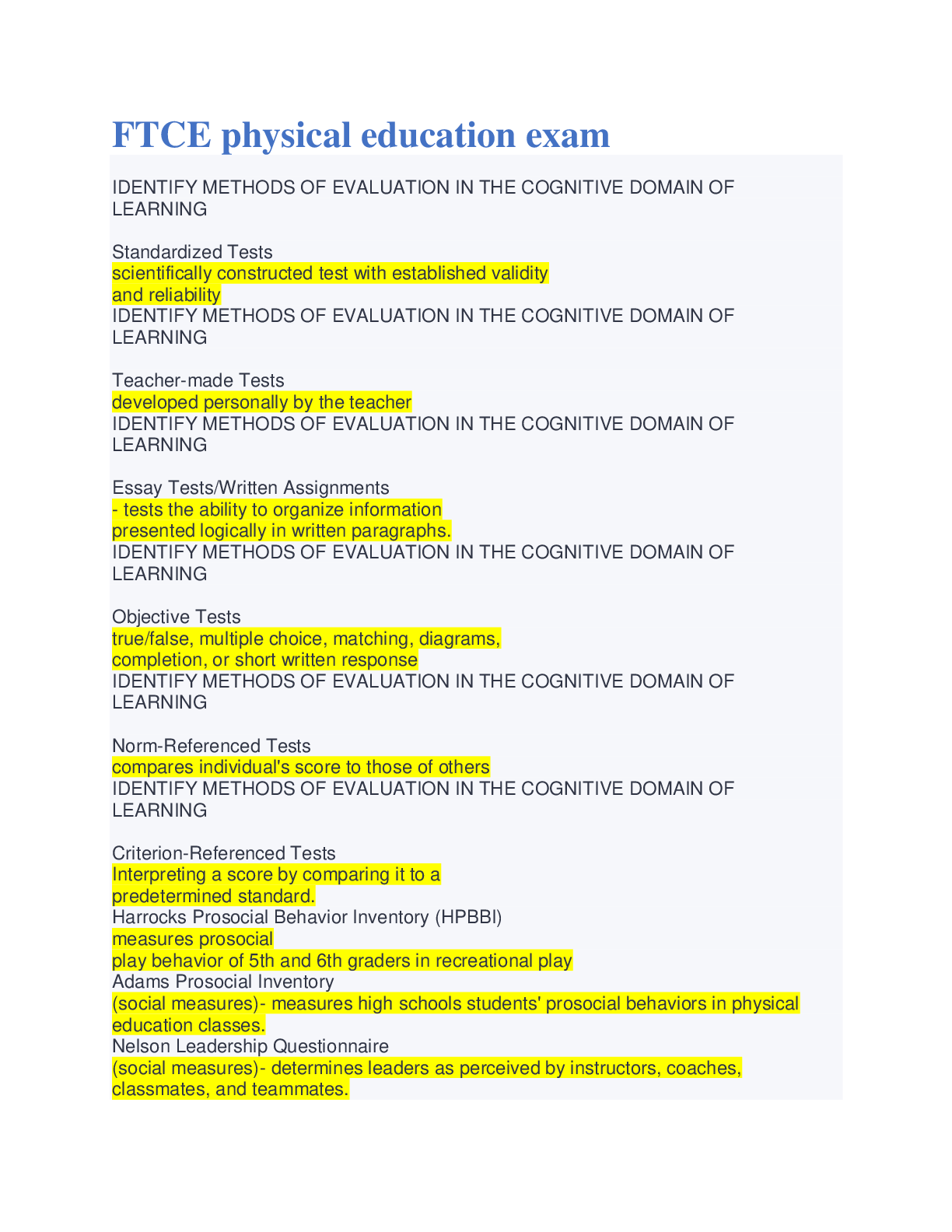Health Care > EXAM > ARDMS PRACTICE EXAM | 157 QUESTIONS| GRADED A (All)
ARDMS PRACTICE EXAM | 157 QUESTIONS| GRADED A
Document Content and Description Below
The congenital cardiac anaomaly seen most frequently in adults is: A. Ebstein's anomaly B. Bicuspid aortic valve C. Ventricular septal defect D. Endocardial cushion defect Correct Answer: B. B... icuspid aortic valve Which endocardiographic window is used in the detection and assessment of the inferior vena cava? A. apical B. subcostal C. parasternal D. suprsternal Correct Answer: B. Subcostal What is the number and location of the papillary muscles of a normal mitral valve? A. one; the posteromedial B. two; the posterolmedial and anterolateral C. two; the inferolateral and posteromedial D. three; the anterolateral, posteromedial, and inferolateral Correct Answer: B. two; the posterolateral and anterolateral Clinically, prolapse of the mitral valve is associated with: A. Opening snap and systolic murmur B. Diastolic murmur and third heart sound C. Fixed splitting of the second heart sound D. Midsystolic click and/or late systolic murmur Correct Answer: D. Midsystolic click and/or late systolic murmur Papillary muscle dysfunction usually results from: A. Dressler's syndrome B. Ischemic heart disease C. Bacterial endocarditis D. Rheumatic heart disease Correct Answer: B. Ischemic heart disease In order to record the vegetation's of endocarditis by echo, the vegetation's must have a diameter of at least: A. One centimeter B. Three millimeters C. Three centimeters D. Five millimeters Correct Answer: B. Three millimeters How many veins connect the pulmonary vascular bed with the left atrium in the normal heart? A. one B. two C. three D. four Correct Answer: D. four Which M-mode finding is considered to be a specific indicator of a fenestrated aortic valve? a. diastolic flutter of the mitral valve b. premature opening of the aortic valve c. diastolic flutter of the aortic valve d. eary systolic closure of the aortic valve Correct Answer: c. diastolic flutter of the aortic valve Which cardiac abnormalities are frequently noted on the echocardiogram of patients with Marfan's syndrome? A. mitral stenosis and pericardial effusion B. mitral valve prolapse and aortic dilatation C. left ventricular aneurysm and thrombus formation D. dilatation of the pulmonary artery and pulmonic stenosis Correct Answer: b. mitral valve prolapse and pericardial effusion Which term is used to describe a segment of ventrcular wall that exhibits no motion? A. akinesis B. dyskinesis C. hypokinesis D. hyperkinesis Correct Answer: A. akinesis A true aneurysm of the left ventricle can usually be distinguished from a pseudoaneurysm because a pseudoaneurysm: A. has a smaller, more narrow [Show More]
Last updated: 2 years ago
Preview 1 out of 40 pages

Buy this document to get the full access instantly
Instant Download Access after purchase
Buy NowInstant download
We Accept:

Also available in bundle (1)

ARDMS SPI Exam Bundled Together (2022/2023)(100% Correct )| Verified (Full Solution Pack)
ARDMS SPI Exam Bundled Together (2022/2023)(100% Correct )| Verified (Full Solution Pack)
By Crum 2 years ago
$30.5
7
Reviews( 0 )
$10.00
Can't find what you want? Try our AI powered Search
Document information
Connected school, study & course
About the document
Uploaded On
Sep 27, 2022
Number of pages
40
Written in
Additional information
This document has been written for:
Uploaded
Sep 27, 2022
Downloads
0
Views
101


























